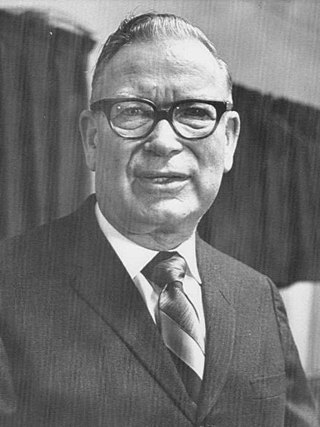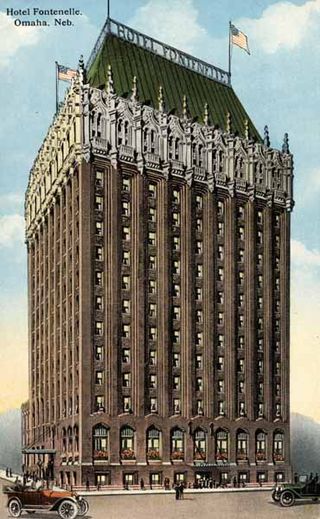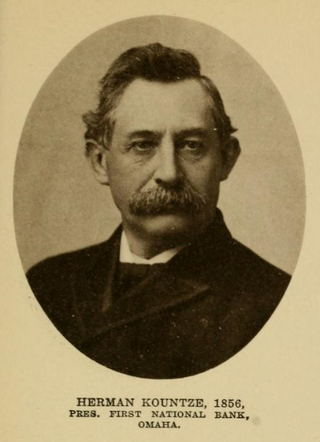The following is a list of cemeteries in Omaha , Douglas County, Nebraska in the United States.
The earliest cemetery in Omaha is the Mormon Pioneer Cemetery, established in 1846 for residents of Culter's Park.
| Cemeteries in Omaha | |||||
|---|---|---|---|---|---|
| Name | Established | Location | Affiliation | Size | |
| Beth El Synagogue Cemetery | 1939 | 4700 South 84th Street (84th & "L"), Ralston | Jewish | 3 acres | |
| Beth Hamedrosh Hagodol Cemetery | 1901 | 8600 South 42 Street, Bellevue | Jewish | ||
| Bird-Ritchie Cemetery | Just west of North 60th Street and half a mile south of Northern Hills Drive | Family | |||
| Bohemian National Cemetery | 1883 | 5201 Center Street | Bohemian | 40 acres | |
| Calvary Cemetery | 7710 West Center Road | Catholic | |||
| Elk City Cemetery | Public | ||||
| Evergreen Memorial Park Cemetery | 2300 South 78 Street | Public | |||
| Fisher Farm Cemetery | 1901 | 8600 South 42 Street, Bellevue | Jewish | ||
| Flower Hill Cemetery, a.k.a. German Lutheran | North 144 Street, between Fort and Ida Streets | Lutheran | |||
| Forest Lawn Memorial Park | 1885 | 7909 Mormon Bridge Road | Private | ||
| Golden Hill Cemetery | 1888 | 5109 North 42 Street, North Omaha | Jewish | ||
| Graceland Park Cemetery | 4723 South 42nd Street | Private | |||
| Holy Sepulchre Cemetery | 4912 Leavenworth Street | Catholic | |||
| Hrabik Cemetery | 8600 South 42 Street, Bellevue | Jewish | |||
| Laurel Hill Cemetery, a.k.a. Sautter's Cemetery, German Cemetery | 1866 | 21st & Polk Streets | |||
| Mormon Pioneer Cemetery | 1846 | 3301 State Street | Mormon | ||
| Mount Auburn Cemetery | Elkhorn | ||||
| Mount Calvary Cemetery | Skyline & CR 78 | ||||
| Mount Hope Cemetery | 7602 Military Avenue | Public | |||
| Mount Sinai Cemetery | North 78 Street & Crown Point Avenue | Jewish | |||
| Old Elkhorn Cemetery a.k.a. Old Britton, Spring Grove | SW of US 275 & S. 222nd | ||||
| Pleasant Hill Cemetery at Millard | Pacific & S. 132nd | Public | |||
| Poor Farm | |||||
| Potter's Field Cemetery | 1887 | 5000 Young Street | Public | ||
| Prospect Hill Cemetery | 1856 | 3202 Parker Street | Public | ||
| Prospect Hill Cemetery at Elkhorn | 0.2 m. W of CR 80 on W. Maple Road/SH 64 | Public | |||
| Resurrection Cemetery | 7710 West Center Road | Catholic | |||
| Saint John's Cemetery | 7506 S 36th Street, Bellevue | Catholic | |||
| Saint Mary Cemetery | 3353 Q Street | Catholic | |||
| Saint Mary Magdalene Cemetery | 5226 South 46 Street | Catholic | |||
| Springwell Danish Cemetery | 1889 | 6326 Hartman Avenue | Danish | ||
| Temple Israel Cemetery | 1871 | 6412 North 42 Street (42nd & Redick), North Omaha | Jewish | 5 acres | |
| Union Cemetery, a.k.a. Noyce Cemetery, Thomas Cemetery | Private | ||||
| Valley Cemetery, a.k.a. Mercer Cemetery | Near CR 15 & CR 106 | Public | |||
| Westlawn-Hillcrest Cemetery | 5701 Center Street | Private | |||

Omaha is the most populous city in the U.S. state of Nebraska and the county seat of Douglas County. Omaha is in the Midwestern United States on the Missouri River, about 10 mi (15 km) north of the mouth of the Platte River. The nation's 40th-most populous city, Omaha's 2020 census population was 486,051.

Douglas County is a county located in the U.S. state of Nebraska. As of the 2020 United States Census, the population is 584,526. It is the state's most populous county, home to well over one-fourth of Nebraska's residents. Its county seat is Omaha, the state's largest city. The county was established in 1854 and named after Stephen A. Douglas (1813–1861), who was then serving as Senator from Illinois.

Roman Lee Hruska was an American attorney and politician who served as a Republican U.S. senator from the state of Nebraska. Hruska was known as one of the most vocal conservatives in the Senate during the 1960s and 1970s.

The Omaha metropolitan area, officially known as the Omaha–Council Bluffs, NE–IA, Metropolitan Statistical Area (MSA), is an urbanized, bi-state metro region in Nebraska and Iowa in the American Midwest, centered on the city of Omaha, Nebraska. The region consists of eight counties, and extends over a large area on both sides of the Missouri River. Covering 4,407 square miles (11,410 km2) and with a population of 967,604 (2020), the Omaha metropolitan area is the most populous in both Nebraska and Iowa, and is the 58th most populous MSA in the United States. The 2003 revision to metropolitan area definitions was accompanied by the creation of micropolitan areas and combined statistical areas. Fremont, in Dodge County, Nebraska, was designated a micropolitan area. The Omaha–Council Bluffs–Fremont Combined Statistical Area has a population of 1,058,125 . Approximately 1.5 million people reside within the Greater Omaha area, within a 50 mi (80 km) radius of Downtown Omaha.

Albert Webb Jefferis was an American Republican Party politician.
Florence is a neighborhood in Omaha, Nebraska, United States on the city's north end and originally one of the oldest cities in Nebraska. It was incorporated by the Nebraska Territorial Legislature on March 10, 1857. The site of Winter Quarters for Mormon migrants traveling west, it has the oldest cemetery for people of European descent and oldest standing gristmill in Nebraska. Florence was the site of an illegal territorial legislature in 1858. Given the high concentration of National Register of Historic Places in the neighborhood, it is regarded as "the historic front door to Omaha as well as the state."

The history of Omaha, Nebraska, began before the settlement of the city, with speculators from neighboring Council Bluffs, Iowa staking land across the Missouri River illegally as early as the 1840s. When it was legal to claim land in Indian Country, William D. Brown was operating the Lone Tree Ferry to bring settlers from Council Bluffs to Omaha. A treaty with the Omaha Tribe allowed the creation of the Nebraska Territory, and Omaha City was founded on July 4, 1854. With early settlement came claim jumpers and squatters, and the formation of a vigilante law group called the Omaha Claim Club, which was one of many claim clubs across the Midwest. During this period many of the city's founding fathers received lots in Scriptown, which was made possible by the actions of the Omaha Claim Club. The club's violent actions were challenged successfully in a case ultimately decided by the U.S. Supreme Court, Baker v. Morton, which led to the end of the organization.

The Prospect Hill Cemetery, located at 3202 Parker Street in the Prospect Hill neighborhood of North Omaha, Nebraska, United States, is believed to be the oldest pioneer cemetery in Omaha. It is between 31st and 33rd Streets and Parker and Grant Streets.
This is a list of lists related to Omaha, Nebraska.

Little Bohemia, or Bohemian Town, is a historic neighborhood in Omaha, Nebraska. Starting in the 1880s, Czech immigrants settled in this highly concentrated area, also called "Praha" (Prague) or "Bohemian Town", bounded by South 10th Street on the east, South 16th Street on the west, Pierce Street on the north, and Martha Street on the south, with a commercial area went along South 13th and South 14th Streets, centered on William Street. It was located south of downtown, and directly west of Little Italy. A portion of the neighborhood along South 13th Street was listed on the National Register of Historic Places in 2020.

Golden Hill Cemetery is located at 5025 North 42nd Street in the North Omaha neighborhood of Omaha, Nebraska.

Frederick Metz (1832–1901) founded and owned the Metz Brewery in Omaha, Nebraska, for forty years. He was also a two-time representative in the Nebraska Legislature, and an influential member of Omaha society.

Herman Kountze was a powerful and influential pioneer banker in Omaha, Nebraska, during the late 19th century. After organizing the Kountze Brothers Bank in 1857 as the second bank in Omaha, Herman and his brothers Augustus, Charles and Luther changed the charter in 1863, opening the First National Bank of Omaha that year. Kountze was involved in a number of influential ventures around Omaha, including the development of the Omaha Stockyards and the Trans-Mississippi and International Exposition of 1898. Immediately after his death Kountze was regarded as one of Omaha's "old settlers". Today Kountze's First National Bank is the oldest bank west of the Mississippi River, and continues as a privately held company in its sixth generation of family ownership.
The Potter's Field Cemetery in Omaha, Nebraska, United States is located on a 5-acre (20,000 m2) plot of land at 5000 Young Street near the intersections of Young Street and Mormon Bridge Road. Like all Potter's Fields, it was used to bury poor people or people with no known identity from across the Omaha area. The cemetery was active from 1887 to 1957.
Forest Lawn Memorial Park, also known as Forest Lawn Cemetery, is located at 7909 Mormon Bridge Road in North Omaha, Nebraska. It was established in 1885 when the mutual Forest Lawn Cemetery Association was donated 100 acres (0.40 km2) in northwest of the city. In 1886, the first interment in the cemetery was the donor of the land, John H. Brackin. Forest Lawn is Omaha's largest cemetery and the burial location of many of Omaha's second generation of leadership.

Byron Reed was an American pioneer real estate businessman and local politician in Omaha, Nebraska. He founded the first real estate office in the Nebraska Territory and became the foremost agent after Nebraska achieved statehood.
The Irish in Omaha, Nebraska have constituted a major ethnic group throughout the history of the city, and continue to serve as important religious and political leaders. They compose a large percentage of the local population.
Significant events in the history of Omaha, Nebraska, include social, political, cultural, and economic activities.
The Beth El Cemetery is a Jewish cemetery located at 4700 South 84th Street in Ralston, a city that is south of Omaha, Nebraska.